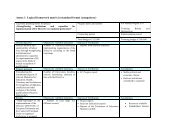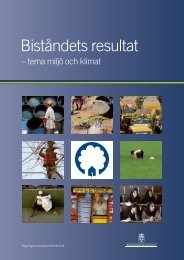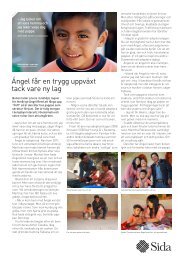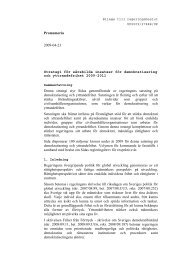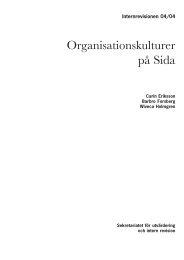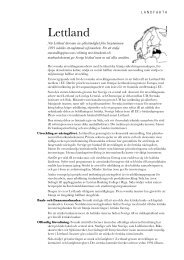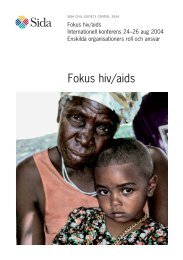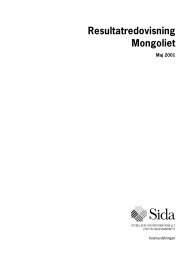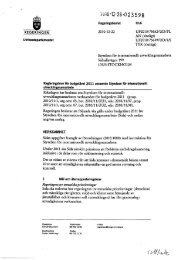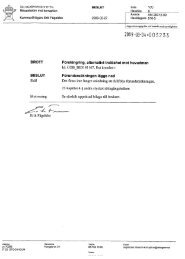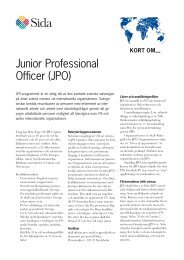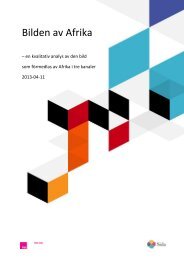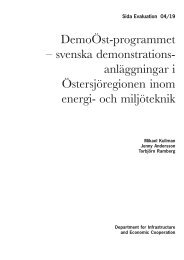Mid-Term Review of the AGIR Programme - Sida
Mid-Term Review of the AGIR Programme - Sida
Mid-Term Review of the AGIR Programme - Sida
You also want an ePaper? Increase the reach of your titles
YUMPU automatically turns print PDFs into web optimized ePapers that Google loves.
A N N E X 3 – I N C E P T I O N R E P O R T<br />
iii) Why is <strong>the</strong>re a tendency for reporting and M+E to focus on activities ra<strong>the</strong>r<br />
than on results? What is required to change this practice?<br />
iv) How are programme results being evaluated throughout <strong>the</strong> programme (i.e. at<br />
various levels from grassroots level to partner, from partner to intermediary/<strong>the</strong>me<br />
level, and from <strong>the</strong>me level to joint program reporting)?<br />
v) Are <strong>the</strong>re effective programme structures that ensure that adequate work is being<br />
done in <strong>the</strong> dimensions <strong>of</strong> gender and human rights-based approaches?<br />
(c) Efficiency<br />
Two questions are proposed in relation to efficiency and are to be addressed within<br />
this evaluative review. The questions are:<br />
i) Is <strong>the</strong> balance between <strong>the</strong> need for local partners to have necessary capacity<br />
to receive core funds and <strong>the</strong> interest <strong>of</strong> intermediaries to disburse funds kept<br />
at an adequate level to ensure quality and minimise fiduciary risks?<br />
ii) Has <strong>the</strong> operation <strong>of</strong> <strong>the</strong> <strong>AGIR</strong> programme had <strong>the</strong> intended effect <strong>of</strong> allowing<br />
<strong>the</strong> Swedish Embassy <strong>of</strong>ficers to spend more time on content and qualitative<br />
follow-up with local partner organisations and to be involved in <strong>the</strong> monitoring<br />
<strong>of</strong> civil society support?<br />
Additional questions to be considered are:<br />
i) In comparison to similar projects in Mozambique, is this programme efficient<br />
in its use <strong>of</strong> donor funding?<br />
(d) Sustainability<br />
Two questions are proposed in relation to sustainability and are to be addressed within<br />
this evaluative review. The questions are:<br />
i) Is it possible (and suitable) to accept more donors into <strong>the</strong> <strong>AGIR</strong> programme?<br />
ii) What is <strong>the</strong> level <strong>of</strong> CSO partnerships that is necessary to sustain <strong>the</strong> programme?<br />
Is <strong>the</strong>re a tipping point where <strong>the</strong>re are too many partners for <strong>the</strong><br />
programme to remain effective and sustainable?<br />
Additional questions to be considered are:<br />
i) Is <strong>the</strong>re a point within <strong>the</strong> <strong>AGIR</strong> programme when CSOs ‘graduate’ out <strong>of</strong> <strong>the</strong><br />
programme? What mechanisms could be put in place to assist CSOs who have<br />
graduated out <strong>of</strong> <strong>the</strong> programme to allow <strong>the</strong>m to continue <strong>the</strong>ir work?<br />
(e) Impact<br />
Three questions are proposed in relation to sustainability and are to be addressed<br />
within this evaluative review. The questions are:<br />
i) Is <strong>the</strong> programme having its intended outcomes – and if not, why?<br />
ii) Is <strong>the</strong> programme likely to produce <strong>the</strong> expected impacts? Did <strong>the</strong> focus on<br />
national partners have a negative influence on this?<br />
iii) What improvements will make <strong>the</strong> programme more likely to achieve expected<br />
outcomes and impact?<br />
99



